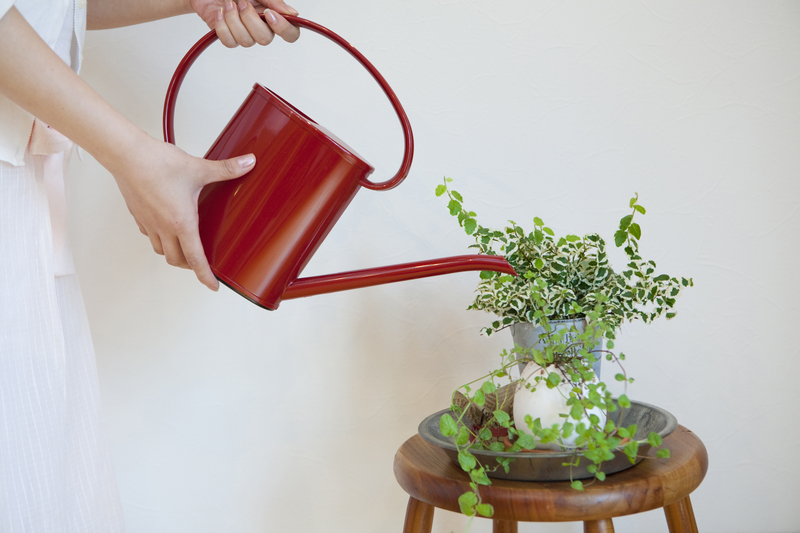Top Three Tips for Managing Weeds in Your Outdoor Space
Posted on 14/06/2025
Top Three Tips for Managing Weeds in Your Outdoor Space
Are you struggling with persistent weeds in your garden, lawn, or backyard? Managing weeds is essential for maintaining a healthy and attractive outdoor environment. Not only do weeds detract from the visual appeal of your green areas, but they also compete with your plants for sunlight, nutrients, and water. With the right strategies, you can keep unwelcome plants under control and enjoy a thriving outdoor space. In this comprehensive guide, discover the top three tips for managing weeds in your outdoor space, along with expert advice, helpful techniques, and best practices to ensure weeds don't take over your beautiful landscape.
Understanding Weeds and Their Impact
Before diving into effective weed management tips, it's important to understand what weeds are and why controlling them is crucial. Weeds are simply unwanted plants that grow where they aren't intended. Common outdoor spaces--such as gardens, pathways, driveways, flowerbeds, and lawns--are prone to various types of weeds, from dandelions and crabgrass to thistles and bindweed.
- Competition: Weeds fight with your desirable plants for water, nutrients, and sunlight, often outcompeting them because of their aggressive growth patterns.
- Disease and Pests: Certain weeds can harbor diseases and pests, threatening the health of your garden or turf.
- Curb Appeal: Unchecked weed growth diminishes the visual charm and value of your property.
Now, let's uncover the best weed control techniques to maintain your outdoor areas.

1. Promote Healthy Lawn and Plant Growth
One of the most effective strategies for outdoor weed management is fostering the healthiest environment for your grass, flowers, and other desired plants. A dense, thriving landscape naturally limits the space and resources available for weeds to take hold.
Practical Ways to Encourage Robust Growth:
- Proper Mowing: Keep your grass at the recommended height for its species. Tall blades of grass shade the soil, making it difficult for weed seeds to germinate. Refrain from cutting more than one-third of the grass height at any one time.
- Regular Feeding: Fertilize your lawn and garden according to seasonal needs. Nourished plants grow vigorously, helping to choke out emerging weeds.
- Watering Wisely: Water deeply and less frequently to encourage deep root systems. Shallow, frequent watering favors weed growth and weakens your established plants.
- Soil Enrichment: Test your soil and amend it as needed to ensure optimal pH and nutrient balance for your chosen plants. Healthy soil creates an inhospitable environment for weeds.
Tip: Overseeding thin lawn areas in early fall or spring helps fill in bare spots, minimizing space for weed invasion.
Advantages of Healthy Plant Growth in Weed Control
- Reduces weed competition naturally without chemicals
- Creates strong root systems that outcompete weed roots
- Improves drought, disease, and pest resistance
2. Use Mulch and Ground Covers as Natural Weed Barriers
Mulching is a time-tested method for outdoor weed suppression. A thick layer of mulch deprives weeds of sunlight, reduces seed germination, and makes it difficult for existing shoots to grow.
Types of Mulch for Weed Control:
- Organic Mulch: Bark chips, straw, wood shavings, compost, leaves, and grass clippings all enrich the soil while deterring weeds.
- Inorganic Mulch: Pebbles, gravel, rubber mulch, and landscape fabric offer long-lasting weed barriers, especially in pathways or around shrubs.
How to Apply Mulch Effectively
- Prepare the Area: Remove existing weeds before laying mulch. Use a garden hoe, pull by hand, or spot-treat stubborn roots.
- Layer Thickness: Apply mulch in a layer about 2 to 4 inches deep. Too thin and weeds may still push through; too thick and it could suffocate roots below.
- Replenish Regularly: Organic mulch decomposes over time. Refresh your mulch annually or as needed to maintain its weed-suppressing benefits.
Ground Covers for Permanent Weed Prevention
Low-growing ground cover plants like creeping thyme, vinca, or clover can be planted in flowerbeds, along borders, or around trees. These dense plantings create a living carpet that shades the soil, blockading space for weeds to emerge.
Benefits of Mulch and Ground Covers
- Reduces weed growth by limiting light and providing physical barriers
- Retains moisture and moderates soil temperature for healthier plants
- Adds visual appeal and organic matter to planting beds
3. Implement Timely and Targeted Weed Removal
Sometimes, despite your best preventive efforts, weeds will still appear in your outdoor areas. The key to effective weed control is to remove them quickly before they spread or set seed.
Manual vs. Chemical Weed Management Methods
- Manual Removal: Uprooting weeds by hand is the most environmentally friendly solution. Use a hand weeder or trowel to extract the entire root, especially for perennial weeds.
- Mechanical Cultivation: Hoeing, tilling, or using weed pullers are effective for larger infestations. However, avoid excessive tilling as it can bring dormant weed seeds to the surface.
- Spot Treatment with Herbicides: For stubborn weeds or large areas, selective herbicides can help. Always follow label instructions and avoid spraying on windy days to prevent harming nearby plants.
Timely Interventions for Best Results
- Early Removal: Uproot weeds when they are young. They are easier to remove, and haven't developed robust root systems or set seed.
- Stay Consistent: Regular walks through your property allow you to address weeds before they multiply. Set aside time every week for a quick inspection and removal session.
- Seed Head Destruction: If you can't pull a big weed immediately, snip off its seed heads to prevent further spreading.
Eco-Friendly Solutions for Weed Management
- Boiling water can scald unwanted plants in cracks or driveways without leaving chemical residue.
- Vinegar-based sprays can desiccate leafy growth, though care must be taken not to spray desirable plants.
Bonus Tips: Integrated Weed Management for Your Outdoor Space
For lasting weed control, combining several weed management techniques is best. This is called integrated weed management. Here are some additional approaches you can use:
- Encourage biodiversity: A richly planted landscape with a variety of species is naturally more resistant to aggressive weed species.
- Address problem areas: Fix bare spots in lawns, repair pathway cracks, and keep garden edges tidy to eliminate weed-friendly habitats.
- Practice crop rotation: In vegetable beds, switch up plant families each year to break weed and pest cycles.
- Solarization: During hot months, use clear plastic sheets to cover soil for several weeks. The sun's heat will kill weed seeds and roots below.

Frequently Asked Questions about Weed Control in Outdoor Spaces
Q1: How can I prevent weeds in my garden beds without chemicals?
Use organic mulches, regular hand-pulling, and densely plant ground covers to smother out weeds naturally. Maintaining healthy soil and properly spaced plants also limits weed growth.
Q2: How often should I mulch my garden?
Mulch should be replenished every 12 to 18 months, or whenever it looks thin and patchy. Organic mulches break down faster than inorganic options.
Q3: Are there pet-safe weed killers?
Yes, many natural weed control solutions--such as boiling water, vinegar sprays, and corn gluten meal--are safe for pets when applied correctly. Always keep pets away from treated areas until dry or as recommended.
Q4: What's the best time of year for weed control?
Early spring is ideal, before weeds get established, but regular removal and intervention throughout the growing season are key for effective outdoor weed management.
Conclusion: Start Your Weed Control Plan Today!
Managing weeds in your outdoor space doesn't have to be a daunting task. By promoting vigorous plant growth, leveraging the power of mulch and ground covers, and practicing timely weed removal, you will enjoy a lush, attractive, and weed-resistant landscape. Combine these top three weed management tips with regular maintenance, and your garden, lawn, or patio will stay beautiful season after season.
Ready to transform your outdoor areas? Start applying these strategies now and watch as your weed worries fade away!
Latest Posts
Effortless Orchid Care for Every Plant Enthusiast
The allure of growing plants through container gardening
Innovative Ideas for Building Enchanting Garden Seating Zones
Harmonize Your Garden with Peaceful Zen Landscaping Concepts

